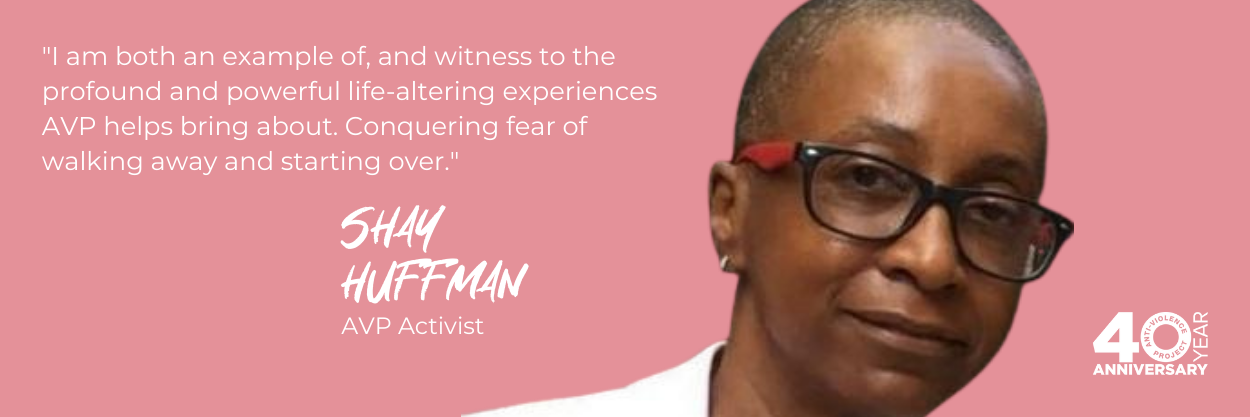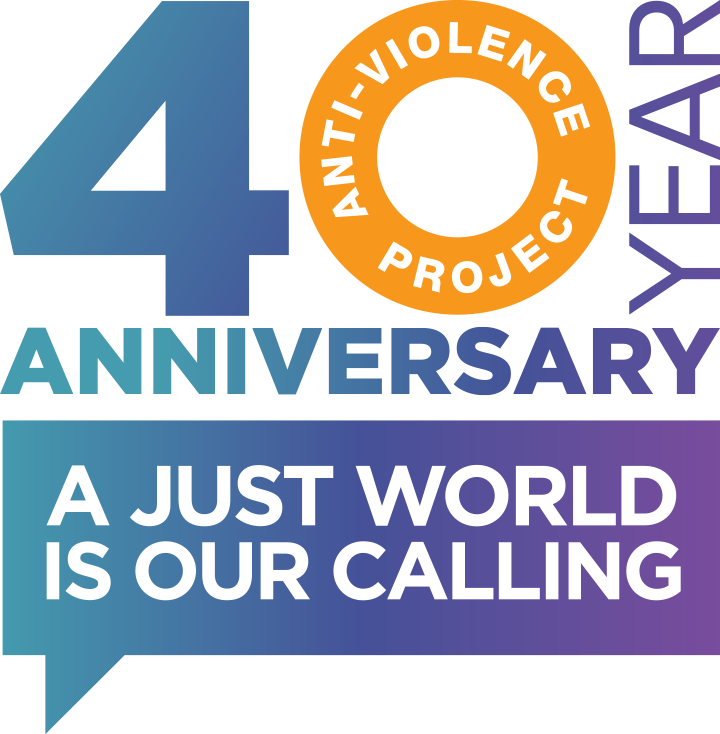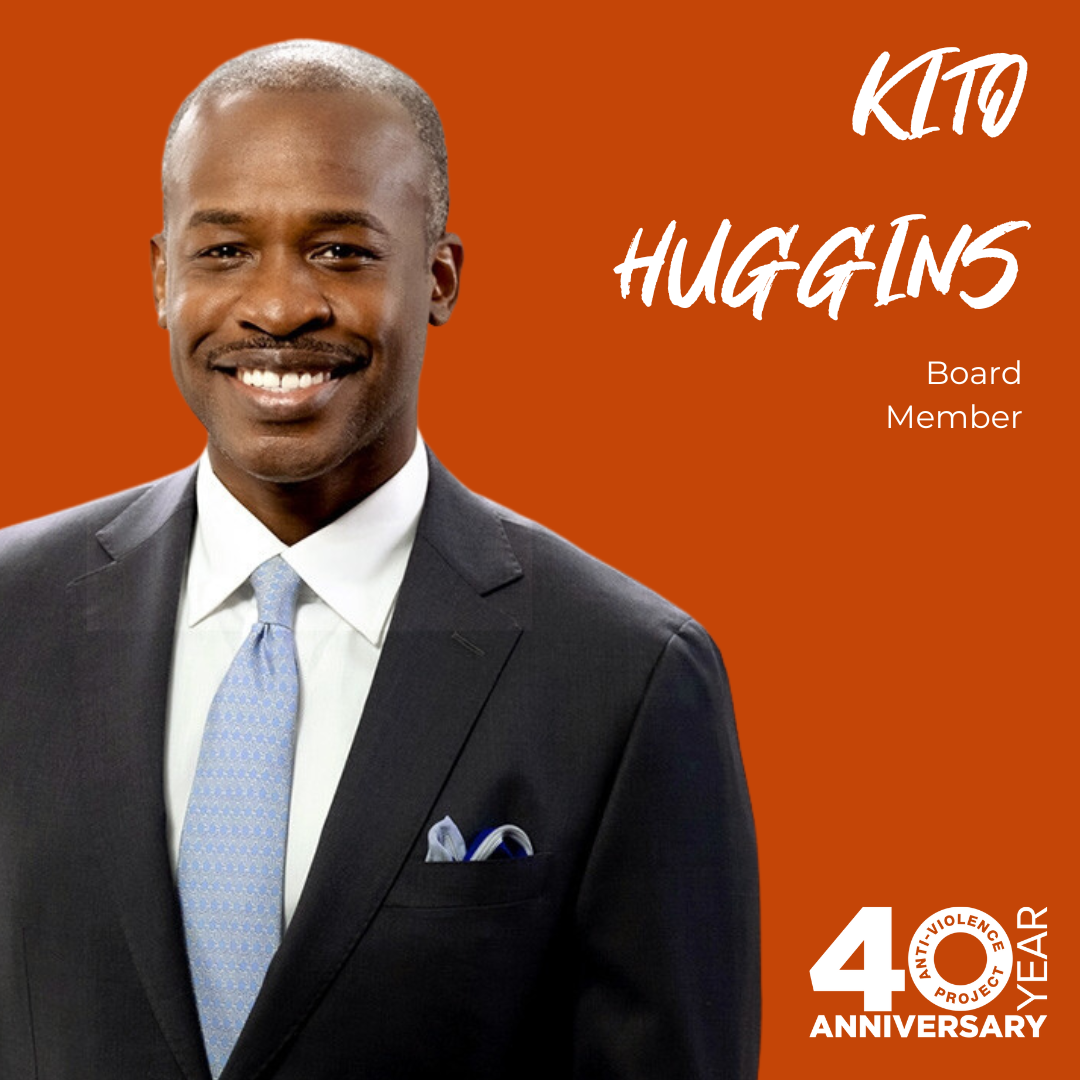
This interview has been shortened and condensed for clarity.
Shay Huffman is many things, but foremost, she is a profound storyteller. Her abilities led her to the incredible advocacy work she’s done with AVP, from fundraising to policy work, to event planning.
But sharing her story was not just something that helped clients, it was also a mode of healing “that was really the way to shed a lot of the shame.” Huffman is a survivor of intimate partner violence who first found AVP in a time of need. She now works as a social worker in the Bronx supporting the social and emotional needs of students, their parents, and the family as a whole in a neighborhood that was one of the hardest hit by COVID.
She attributes much of her growth as a person to the work of AVP because “every step of the way, there was never a point at which I did not feel supported.”
“I’m not sure I’m still where I’m ultimately going to land,” she said, “but I’m certainly on the right path.”
When and how did you first learn about AVP?
I came to AVP as a client back in early 2012. I was in Connecticut, in the throes of a violent, destructive relationship with a woman I had married only a year earlier.
On a regular basis, I was the target of taunts, threats of physical harm, caustic comments, and hurled objects. I’m not a large person — the most I’ve ever weighed is 130 pounds, but by the time I got out of that marriage, I was at 95 pounds, and thinking quickly. Physically, emotionally, mentally, and financially drained, my sanity hung by the slimmest of threads. I was acutely aware if I did not get out, I would soon be dead. I wanted to return to the safety and routine of NYC where I worked and maintained an apartment. Problem was, there was no clear path forward. So much shame and embarrassment! And fear of judgment by family and friends was a huge factor.
Afraid to seek help close to the residence, I somehow found a domestic violence support center a few towns away. They confirmed my deepest fear and suggested an online search for city-based resources. That is how I found AVP. My first AVP contact was Miss Vicky (Victoria Cruz). She believed everything I shared! She gave me hope! She and the AVP survivor’s support group sustained me and supplied tools essential to navigating and maintaining a healthy path forward.
What inspired you to engage us and our work?
I am both an example of, and witness to the profound and powerful life-altering experiences AVP helps bring about. Conquering fear of walking away and starting over. Growing past pain and shame to disclose a story of survival. Joining COPA’s Speakers Bureau to share a personal story of survival that empowers the storyteller and informs and educates the community and the public. Training to take hotline calls to help another through the night and realize their future did not have to replicate their past. AVP was such an essential part of my survival and growth, how could I not engage? It was the beginning of an entirely new life.
I would explain it as though I was in a dark room, like pitch black, and then suddenly someone started turning on the lights. First, it was sort of a dim light. And then it just got brighter, to the point where it was suddenly this full clarity, and with the clarity comes, “Okay, I can see better, so I can grasp better.” I just felt myself getting stronger and having confidence, which I didn’t have at all to start.
Can you describe your experience being a part of AVP’s work?
Two words: Life-saving. Life-altering.
Being part of AVP provided the opportunity to engage with and learn the stories of individuals I would not have met otherwise. Hearing their struggles and learning their histories strengthened my own resolve. I was always aware that systems and policies operated to deny many communities equitable access and opportunities. At AVP, I saw the effects and outcomes up close and personal. There, I became a change agent. The knowledge, tools, and confidence gained, relationships built, can only be described in the superlative.
How has AVP’s work impacted you personally?
I always knew about structural racism and all that goes with it, but being there and seeing so many folks in the community, whether they were immigrants, LGBTQ community members, trans folks, folks with HIV — seeing it up close and personal, the impact it has, it was like, “Wait a minute, maybe I can help effect change here.” I think I really realized the power.
Before AVP, I was employed in the corporate world. While that job provided creature comforts, I yearned for much more. I wanted a pursuit for which I had passion. The universe interceded!
It was Yasmin, one of the Advocacy folks, that said, “Shay, if you ever really want to apply to the social work school, I’ll be happy to write a reference.” And I thought, okay, I’ll give it a shot. And to my surprise was accepted and yeah, jumping ahead. That’s how I got into social work. That was two years ago.
Why do you continue to do what you do?
Just being engaged with community, just being involved, just doing the work, doing the research, reading the people, hearing their stories, and then seeing their responses to my story and to what I shared and, to my being out there and working on as an ally and an accomplice and hearing people say, “Thank you.” And seeing the looks in their eyes and the looks in their faces.
What are some of your crucial learnings from your time at AVP?
Anytime we have an opportunity to educate a person, whether it be a next door neighbor, whether it be a kid in school, a staff member, someone on a bus — it doesn’t mean you have to be part of a huge arena, but you can effect change even on smaller levels. I mean, that’s all about sharing with someone else. It may change their way of thinking or open their way of thinking and they may, in turn, take it forward.
Anytime I’m informing and educating and participating, even in schools, I’m in the position to affect change. And for me, that’s what it’s all about.




